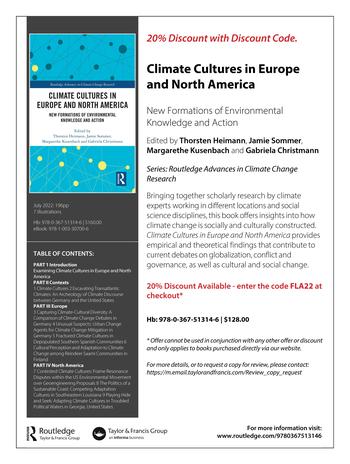New Book „Climate Cultures in Europe and North America: New Formations of Environmental Knowledge and Action“ with a Contribution of Dr. Julia Teebken
The book gathers different social science perspectives regarding climate change and provides insights into the social and cultural construction of the climate change.
News from Aug 15, 2022
Edited by Thorsten Heimann, Jamie Sommer, Margarethe Kusenbach, and Gabriela Christmann, this anthology comprises a collection of analyses that explore climate cultural formations in different spaces and regions in the United States and the European Union. The thematic focus lies particularly on the emergence of new social movements and coalitions dedicated to combating climate change. For while existing studies of climate-cultural differences are predominantly rooted in a static understanding of culture, cultural globalization theory suggests that new formations emerge dynamically at different social and spatial scales. In this area, the anthology provides exciting empirical and theoretical insights that contribute to current debates of globalization, conflict and governance, and cultural and social change.
In Chapter 9 ("Playing Hide and Seek: Adapting Climate Cultures in Troubled Political Waters in Georgia, United States") Julia Teebken discusses informal political processes and local coping strategies that political practitioners in the climate-skeptic state Georgia have developed to advance climate policy. Contrary to the widespread perception that the southeastern state of Georgia is a "blank spot" when it comes to climate policy engagement, diverse actors make use of multiple mechanisms that enable them to implement climate policy projects despite adverse conditions and politically motivated climate skepticism. The results suggest that coping strategies have manifested themselves at different levels. At the social level, actors have built creative coalitions and new networks to advance decision-making processes related to climate change. At the knowledge level, local policy planners have developed various communication strategies: These include (1) adapting language and using non-climatic frames, (2) actively constructing narratives and audience-specific addresses, and (3) tying into locally and culturally prevalent issues. These strategies, which are outcomes of local political actors' experience with decision-making in climate-skeptical political environments, enable climate policy issues to be placed on Georgia's political agenda.
These coping strategies represent a form of climate culture in terms of adapted local policy planning that enable climate policy issues to be placed on agendas despite climate skeptical political environments. The strategies are context-specific to the southeastern U.S., but can be applied to other regions and policy levels as appropriate.
The publication can be found here. Use the attached flyer to receive a 20% discount on the anthology.
